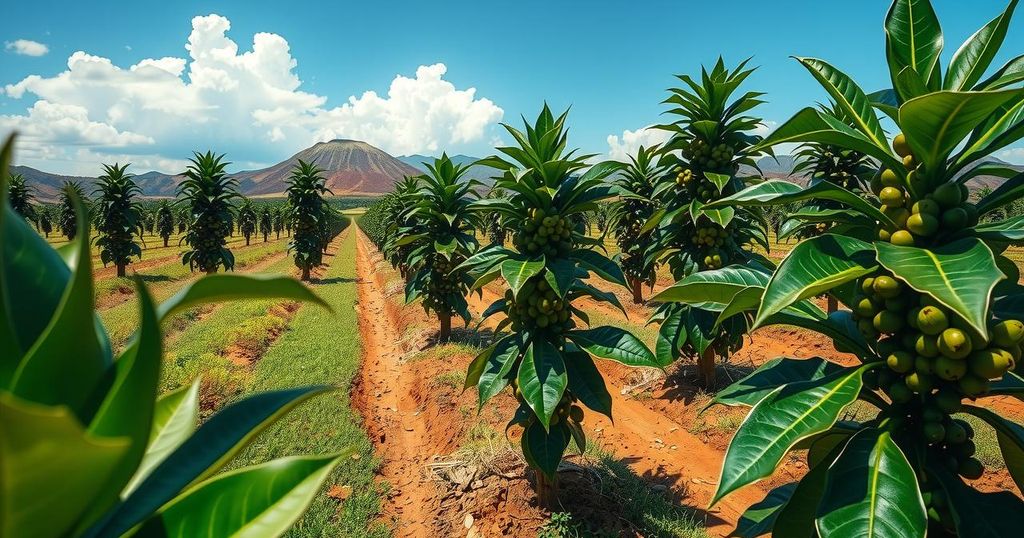Insufficient Rainfall in Brazil and Its Impact on Coffee Prices
Coffee prices rose on Wednesday, underpinned by insufficient rainfall in Brazil and a strong Brazilian real. Dry conditions have lowered coffee crop forecasts, particularly for arabica coffee, heightening supply concerns. Both domestic and global production issues, along with export dynamics, add complexity to the coffee market outlook.
On Wednesday, coffee prices experienced moderate gains, attributed to dry conditions in Brazil and a strengthening Brazilian real. Specifically, May arabica coffee closed up by 1.89%, while May ICE robusta coffee saw an increase of 1.06%. According to Somar Meteorologia, Brazil’s major arabica-producing region, Minas Gerais, received significantly less rainfall than average for the week leading up to March 15, further fuelling concerns regarding supply.
The Brazilian real reached a four-and-a-half-month high against the US dollar on Wednesday, which deterred local producers from selling their coffee exports. However, gains in robusta coffee were somewhat constrained due to rising supplies, evidenced by ICE-monitored robusta coffee inventories climbing to a one-week high of 4,336 lots, in contrast to a decrease in arabica coffee inventories to a three-and-a-half-week low of 782,648 bags.
Concerns about supply continue to underpin coffee prices; notably, Cecafe reported a year-on-year decline of 12% in Brazil’s February green coffee exports, totaling 3 million bags. Additionally, Brazil’s national crop forecasting agency, Conab, adjusted its estimates, predicting a 4.4% year-on-year decline for the 2025/26 coffee crop, signaling potential long-term threats to production.
Contrarily, a report by Marex Solutions indicated an expected global coffee surplus of 1.2 million bags for the 2025/26 season, an increase from the previous surplus of 200,000 bags for the 2024/25 season. On a bearish note for robusta coffee, Vietnam’s coffee exports rose by 6.6% year-on-year in February, posing additional pressure on prices.
The prolonged dry spell, exacerbated by El Niño conditions, has raised alarms about potential lasting damage to coffee crops in South and Central America. Brazil has been experiencing its driest conditions since 1981, significantly affecting coffee trees during critical growth phases, while Colombia gradually recovers from similar drought issues.
Robusta coffee prices are bolstered by a downturn in production, primarily in Vietnam, which reported a 20% decline in coffee production for the 2023/24 crop year. Projections indicate a further dip in robusta output for the upcoming marketing year. Furthermore, Vietnam’s 2024 coffee export estimates have also decreased significantly, highlighting challenges within that market.
Positive news regarding Brazil’s coffee exports paints a complex picture; while Conab reported a record rise in 2024 exports, the International Coffee Organization noted significant declines in global coffee exports for late 2023. The USDA’s biannual report provided mixed signals as well, projecting increases in world coffee production but also forecasted declines in ending stocks for 2024/25.
Efforts by Volcafe revealed worries about future production estimates, cutting Brazil’s arabica coffee projections significantly due to the drought’s impact. They now anticipate an arabica coffee deficit for 2025/26 that is larger than the previous year’s deficit, marking continued challenges for the coffee sector.
Overall, Brazil’s insufficient rainfall and rising coffee production concerns are significantly influencing coffee prices. Despite some positive export reports, challenges such as drought conditions and lowered production estimates remain pertinent. The delicate balance of supply and demand, alongside currency variations, will continue to shape the coffee market in the coming months.
Original Source: www.nasdaq.com




Post Comment